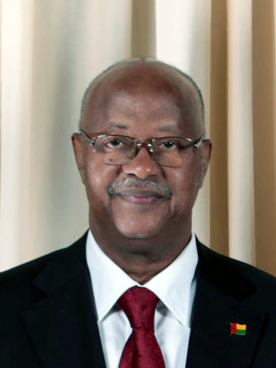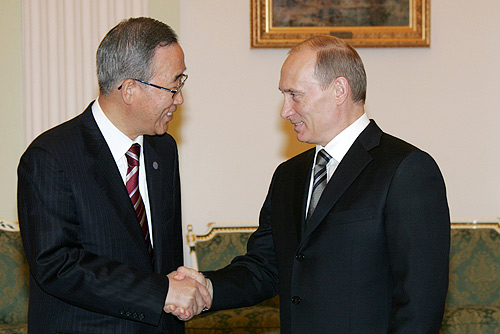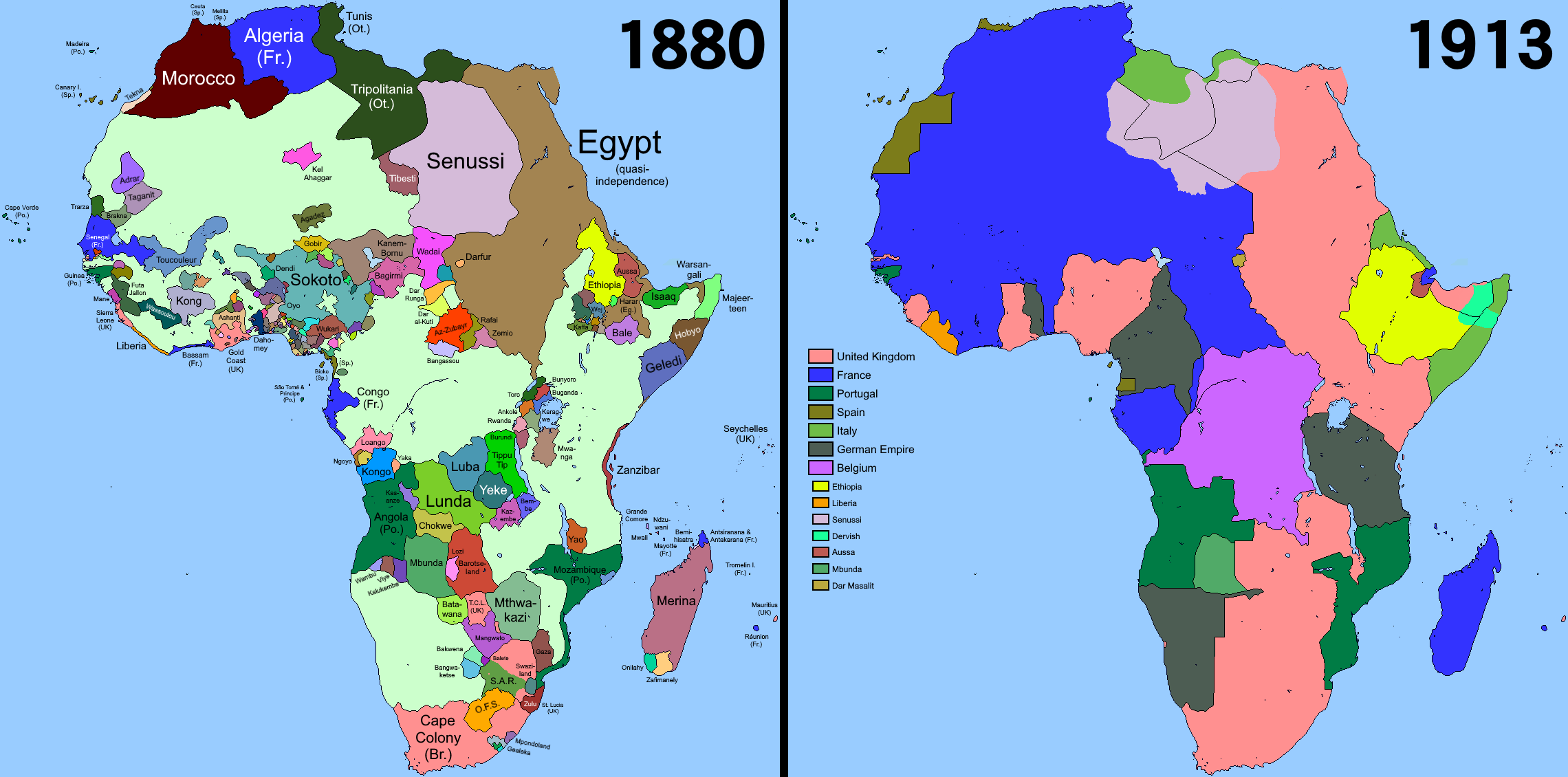|
2012 Guinea-Bissau Coup D'état
On 12 April 2012, a coup d'état in Guinea-Bissau was staged by elements of the armed forces about two weeks before the second round of a 2012 Guinea-Bissau presidential election, presidential election between Carlos Gomes Júnior and Kumba Ialá. The coup started in the evening with military personnel and equipment making its way onto the streets, followed by the state-owned media being taken off-air. Both second-round candidates and the incumbent president were initially arrested by the junta. Members of the Military Council, which ran the country until an interim National Transitional Council was established on 15 April, said that one of the reasons for the coup was the incumbent civilian administration's call for Angolan help to reform the military. Following international condemnation and sanctions against leaders of the junta, an agreement was signed that led to the third place candidate in the election, Manuel Serifo Nhamadjo, being selected as interim president. The pres ... [...More Info...] [...Related Items...] OR: [Wikipedia] [Google] [Baidu] |
Guinea-Bissau
Guinea-Bissau, officially the Republic of Guinea-Bissau, is a country in West Africa that covers with an estimated population of 2,026,778. It borders Senegal to Guinea-Bissau–Senegal border, its north and Guinea to Guinea–Guinea-Bissau border, its southeast. Guinea-Bissau was once part of the kingdom of Kaabu, as well as part of the Mali Empire. Parts of this kingdom persisted until the 18th century, while a few others had been under some rule by the Portuguese Empire since the 16th century. In the 19th century, it was colonised as Portuguese Guinea. Portuguese control was restricted and weak until the early 20th century, when its pacification campaigns solidified Portuguese sovereignty in the area. The final Portuguese victory over the last remaining bastion of mainland resistance came in 1915, with the conquest of the Papel people, Papel-ruled Kingdom of Bissau by the Portuguese military officer João Teixeira Pinto, Teixeira Pinto and the Wolof people, Wolof mercenary ... [...More Info...] [...Related Items...] OR: [Wikipedia] [Google] [Baidu] |
Coup D'état
A coup d'état (; ; ), or simply a coup , is typically an illegal and overt attempt by a military organization or other government elites to unseat an incumbent leadership. A self-coup is said to take place when a leader, having come to power through legal means, tries to stay in power through illegal means. By one estimate, there were 457 coup attempts from 1950 to 2010, half of which were successful. Most coup attempts occurred in the mid-1960s, but there were also large numbers of coup attempts in the mid-1970s and the early 1990s. Coups occurring in the post-Cold War period have been more likely to result in democratic systems than Cold War coups, though coups still mostly perpetuate authoritarianism. Many factors may lead to the occurrence of a coup, as well as determine the success or failure of a coup. Once a coup is underway, coup success is driven by coup-makers' ability to get others to believe that the coup attempt will be successful. The number of successful cou ... [...More Info...] [...Related Items...] OR: [Wikipedia] [Google] [Baidu] |
Lusophone
The Portuguese-speaking world, also known as the Lusophone world () or the Lusophony (''Lusofonia''), comprises the countries and territories in which the Portuguese language is an official, administrative, cultural, or secondary language. This article provides details regarding the geographical distribution of all Portuguese-speakers or Lusophones, regardless of legislative status. Portuguese is one of the List of languages by total number of speakers, most widely spoken languages in the world and is an official language of countries on four continents. Statistics Native speakers This table depicts the first language, native speakers of the language, which means that the table includes people who have been exposed to the Portuguese language from birth and, thus, excludes people who use the language as a second language (L2). Status by country Spread of Portuguese During a Age of Discovery, period of Portuguese discoveries and through a Portuguese Empire, large col ... [...More Info...] [...Related Items...] OR: [Wikipedia] [Google] [Baidu] |
Demographics Of Guinea-Bissau
This is a demography of the population of Guinea-Bissau including population density, ethnicity, education level, health of the populace, economic status, religious affiliations and other aspects of the population. Population According to the 2025 revision of the The World Factbook the total population was 2,132,325 in 2024. The proportion of children below the age of 14 in 2020 was 43.17%, 53.75% was between 15 and 65 years of age, while 3.08% was 65 years or older. The proportion of the population below the age of 15 in 2010 was 41.3%, 55.4% were aged between 15 and 65 years of age, while 3.3% were aged 65 years or older. Population Estimates by Sex and Age Group (01.VII.2019) (Data refer to national projections.): Vital statistics Registration of vital events is in Guinea-Bissau not complete. The Population Departement of the United Nations prepared the following estimates. Life expectancy Ethnic groups * Fulani 28.5% * Balanta 22.5% * Mandinga 14.7% * Papel 9.1 ... [...More Info...] [...Related Items...] OR: [Wikipedia] [Google] [Baidu] |
Ban Ki-moon
Ban Ki-moon (born 13 June 1944) is a South Korean politician and diplomat who served as the eighth secretary-general of the United Nations between 2007 and 2016. Prior to his appointment as secretary-general, Ban was the South Korean minister of foreign affairs and trade between 2004 and 2006. Ban was initially considered to be a long shot for the office of Secretary-General of the United Nations; he began to campaign for the office in February 2006. As the foreign minister of South Korea, he was able to travel to all the countries on the United Nations Security Council, a manoeuvre that subsequently turned him into the campaign's front-runner. On 13 October 2006, Ban was elected as the eighth secretary-general by the United Nations General Assembly. On 1 January 2007, he succeeded Kofi Annan. As secretary-general, he was responsible for several major reforms on peacekeeping and UN employment practices around the world. Diplomatically, Ban has taken particularly strong view ... [...More Info...] [...Related Items...] OR: [Wikipedia] [Google] [Baidu] |
Constitution Of Guinea-Bissau
The Constitution of Guinea-Bissau is the basic law governing Guinea-Bissau. It was adopted in 1984, came into force on 6 May 1984, and revised in 1991, 1993 and 1996. External links * Constitution of Guinea-Bissau Guinea-Bissau
Guinea-Bissau, officially the Republic of Guinea-Bissau, is a country in West Africa that covers with an estimated population of 2,026,778. It borders Senegal to Guinea-Bissau–Senegal border, its north and Guinea to Guinea–Guinea-Bissau b ...
Politics of Guinea-Bissau
{{GuineaBissau-stub ...
[...More Info...] [...Related Items...] OR: [Wikipedia] [Google] [Baidu] |
Guinea-Bissau Presidential Election, 2012
Presidential elections were held in Guinea-Bissau on 18 March 2012 following the death of President Malam Bacai Sanhá on 9 January. A run-off was set to be held on 29 April after being postponed by a week as announced by electoral commission chief Desejado Lima Dacosta. However, after a military coup, the leading candidates were arrested and the election was cancelled. The junta's spokesman then announced plans to hold an election in two years, despite condemnation. General elections were subsequently held in April 2014. Background Following the death of Malam Bacai Sanhá on 9 January 2012, an early presidential elections were scheduled to be held within 90 days, in accordance with the constitution. No president in the history of independent Guinea-Bissau has completed his term in office: Three presidents have been ousted, one was assassinated, and another died in office. Campaign Prime Minister Carlos Gomes Júnior resigned on 10 February to run for the presidency. A tot ... [...More Info...] [...Related Items...] OR: [Wikipedia] [Google] [Baidu] |
Malam Bacai Sanhá
Malam Bacai Sanhá () (5 May 1947 – 9 January 2012) was a Guinea-Bissau politician who was President of Guinea-Bissau from 8 September 2009 until his death on 9 January 2012. A member of the African Party for the Independence of Guinea and Cape Verde (PAIGC), Sanhá was President of the National People's Assembly from 1994 to 1999 and then served as acting President of Guinea-Bissau from 14 May 1999, to 17 February 2000, following the ouster of President João Bernardo Vieira. Standing as the PAIGC candidate, he placed second in the 1999–2000 presidential election as well as the 2005 presidential election before winning the June–July 2009 presidential election. Personal life Sanhá was born on 5 May 1947"Guinea-Bissau: Biography of presidential candidate Sanha", PANA, 18 January 2000. in the Quinara region to a Muslim family. He was married to Mariama Mane Sanha until his death in 2012. Early political career A long-time member of PAIGC, Sanhá served as governor o ... [...More Info...] [...Related Items...] OR: [Wikipedia] [Google] [Baidu] |
2011 Guinea-Bissau Coup Attempt
The 2011 Guinea-Bissau coup attempt was a failed coup d'état by a group of renegade soldiers. Taking place on the morning of December 26, 2011, fighting broke out between two factions in the armed forces with sounds of automatic weapons and rocket fire erupting in the Santa Luzia army base which alarmed residents in the country's capital of Bissau. Officials claim it started when Navy Chief Jose Americo Bubo Na Tchuto sent orders to arrest Army Chief Antonio Injai, who was later freed by his men. Afterwards, the Army Chief in turn arrested the Navy Chief for his involvement in the incident however he denies issuing such orders to his troops, saying he had been "spending nights at home, not in the barracks." During the early hours of the coup when it was still unclear what was the cause of the trouble, some speculated it was an attack on the military HQ by soldiers demanding better pay while others claimed it was a struggle between the armed forces for control of drug smuggling ... [...More Info...] [...Related Items...] OR: [Wikipedia] [Google] [Baidu] |
2010 Guinea-Bissau Military Unrest
Military unrest occurred in Guinea-Bissau on 1 April 2010. Prime Minister Carlos Gomes Junior was placed under house arrest by soldiers, who also detained Army Chief of Staff Zamora Induta. Supporters of Gomes and his party, PAIGC, reacted to the move of the military by demonstrating in the capital, Bissau; Antonio Indjai, the Deputy Chief of Staff, then warned that he would have Gomes killed if the protests continued.Assimo Balde"Soldiers put Guinea-Bissau PM under house arrest" Associated Press, 1 April 2010. Events of 1 April In the morning of 1 April 2010, Prime Minister Carlos Gomes Junior's office was besieged by soldiers. Gomes was detained by the soldiers and moved to a military camp, although he was taken to his home later in the day and kept there under guard. Zamora Induta, the Army Chief of Staff, was also detained and held at the camp. Admiral Bubo Na Tchuto, who had taken refuge at the United Nations The United Nations (UN) is the Earth, global intergovernment ... [...More Info...] [...Related Items...] OR: [Wikipedia] [Google] [Baidu] |
Portugal
Portugal, officially the Portuguese Republic, is a country on the Iberian Peninsula in Southwestern Europe. Featuring Cabo da Roca, the westernmost point in continental Europe, Portugal borders Spain to its north and east, with which it shares Portugal-Spain border, the longest uninterrupted border in the European Union; to the south and the west is the North Atlantic Ocean; and to the west and southwest lie the Macaronesia, Macaronesian archipelagos of the Azores and Madeira, which are the two Autonomous Regions of Portugal, autonomous regions of Portugal. Lisbon is the Capital city, capital and List of largest cities in Portugal, largest city, followed by Porto, which is the only other Metropolitan areas in Portugal, metropolitan area. The western Iberian Peninsula has been continuously inhabited since Prehistoric Iberia, prehistoric times, with the earliest signs of Human settlement, settlement dating to 5500 BC. Celts, Celtic and List of the Pre-Roman peoples of the Iberia ... [...More Info...] [...Related Items...] OR: [Wikipedia] [Google] [Baidu] |
History Of Guinea-Bissau
The region now known as Guinea-Bissau, in West Africa, has been inhabited by humans for thousands of years. During the 13th century CE, it was a province of the Mali Empire which later became independent as the empire of Kaabu. The Portuguese Empire claimed the region during the 1450s, but its control was limited to several forts along the coast during most of this period; it gained control of the mainland after a series of " pacification campaigns" from 1912 to 1915, which used military forces to violently crush local resistance. The offshore Bijagos Islands were not colonized until 1936. Guinea-Bissau gained independence from Portugal in 1974. The introduction of multi-party politics in 1991 led to the first multi-party elections in 1994. A civil war broke out in 1998, which lasted until the following year. Peoples Although the region's history has not yet been extensively documented with archaeological records, it had a population of hunter-gatherers by 1000 CE. Agriculturis ... [...More Info...] [...Related Items...] OR: [Wikipedia] [Google] [Baidu] |




